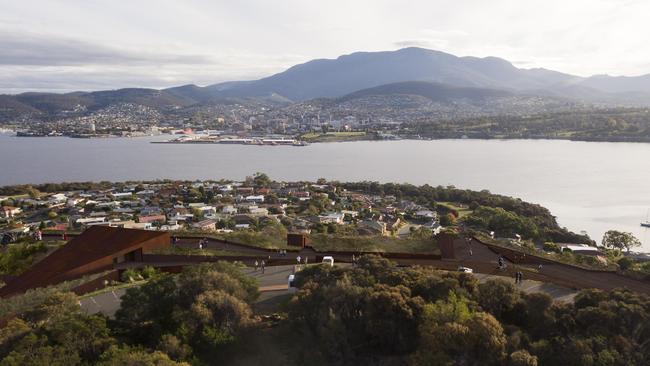Rosny Hill Friends Network officially lodges appeal against luxury hotel development
Opponents of the council-approved Rosny Hill development have lodged their appeal with the state’s planning tribunal. SEE THEIR OBJECTIONS

Business
Don't miss out on the headlines from Business. Followed categories will be added to My News.
OPPONENTS of the Rosny Hill development have officially lodged their appeal with the Resource Management and Planning Appeal Tribunal.
Last month, the luxury hotel development at the Eastern Shore site was given the thumbs up from council despite passionate objections from members of the community against the proposal.
The Clarence City Council approved the approximate $50 million proposal by Hunter Developments, led by architect Robert Morris-Nunn.
The project would feature a 60-room visitor accommodation complex, two restaurants, a cafe and a public viewing deck with new public walking trails.

Hunter Developments was awarded preferred developer status for development on the crown reserve land by the council in 2015.
In response to community concerns, the original concept has been reduced in scale, the number of rooms almost halved and the proposal for a conference centre abandoned.
The proposal had received 541 representations from the community, mostly objecting to the proposal on a range of grounds, including issues such as the impact on vegetation and fauna, traffic, noise and the use of public land for private development.
MORE:
ROSNY HILL PROPOSAL RECOMMENDED FOR APPROVAL
CONSERVATION TRUST CLAIMS PROPONENT HAS DOWNPLAYED PROJECT
Hobart lawyer Roland Browne has now lodged an appeal of the council’s approval on behalf of the Rosny Hill Friends Network.
There are five grounds of appeal.
The appellants argue the development application was for a tourist operation rather than the proponent’s description of public recreation facilities, visitor accommodation and food services.
“The three individual uses, either individually or collectively, do not complement and enhance the use of the land for recreational purposes,” the appeal documents state.
The appellants also argue the noise emission from the development will cause environmental harm within the surrounding residential zone.


